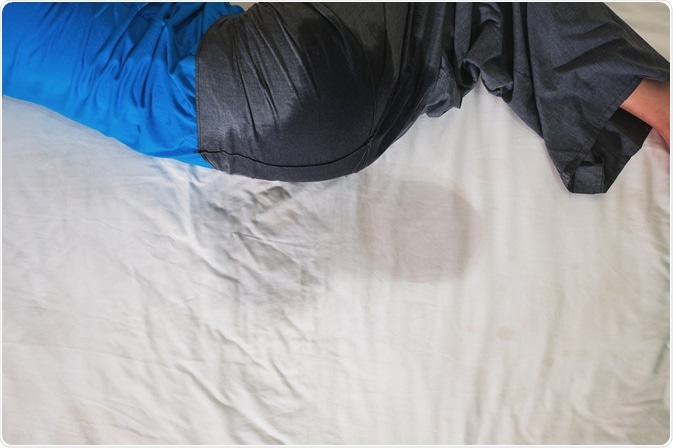Nocturnal enuresis is the most common type of urinary incontinence disorder to arise in children. Despite its frequent occurrence in children, the etiology of nocturnal enuresis is complex and therefore not clearly understood.

Image Credit: Jes2u.photo/Shutterstock.com
An overview of nocturnal enuresis
Developmentally, children between the ages of 5 to 7 years should refrain from urinating during their sleep. However, due to various primary and secondary causes, nocturnal enuresis currently affects between 5 to 7 million children in the United States alone.
As one of the most common complaints in pediatric urology clinics, nocturnal enuresis, which is more commonly referred to as bedwetting, is defined as the inappropriate and often nonvoluntary urination that occurs in individuals who are past the age of usual control.
More specifically, nocturnal enuresis affects approximately 25% of all 5-year-old children and gradually decreases with age, with 10% of all 7-year-old children, 5% of all 10-year-old children, and 0.5-1% of the adult population being affected by this condition.
Primary vs. secondary nocturnal enuresis
Nocturnal enuresis is commonly characterized as either primary or secondary types, as well as monosymptomatic or polysymptomatic.
Whereas monosymptomatic nocturnal enuresis indicates a child only experiencing involuntary urination, polysymptomatic enuresis indicates a patient with both involuntary urination and at least one additional lower urinary tract symptoms such as increased urgency, frequency, dysuria, or dribbling.
Primary nocturnal enuresis
Primary nocturnal enuresis occurs as a result of the failure of a child to awake from sleep, despite receiving stimuli that indicate the need to urinate. In addition to the presence of a stimulus, excessive urine production, the small capacity of the bladder, and/or detrusor overactivity also contribute to primary nocturnal enuresis.
Accounting for up to 80% of all nocturnal enuresis cases, children with primary nocturnal enuresis will not experience a single period of nighttime urinary control for 6 months or longer.
A positive family history of nocturnal enuresis in which one parent previously suffered from this condition can increase the likelihood that their child will also experience bedwetting by 44%. When a child has two parents with a positive history of nocturnal enuresis, this risk increased to 77%. This positive family history may or may not be associated with a genetic predisposition that has been identified as potential loci on chromosomes 12, 13, and 21.
Secondary nocturnal enuresis
As compared to primary nocturnal enuresis, children with secondary nocturnal enuresis will experience at least 6 consecutive months of nighttime urinary control before symptoms of incontinence arise. The potential causes of secondary nocturnal enuresis can be organic or psychological.
Physiological factors
The physiological causes of secondary nocturnal enuresis include constipation, infection, dysfunction and/or malformations of the urinary tract system, an overactive or neurogenic bladder, diabetes mellitus, or obstructive sleep apnea. In addition to nocturnal enuresis, patients with many of these health conditions will experience several compounding symptoms.
Children with chronic constipation and nocturnal enuresis, for example, will also typically suffer from encopresis, hard stools, and overflow incontinence. Comparatively, children with obstructive sleep apnea will also suffer from daytime somnolence and snoring.
Aside from those with obstructive sleep apnea, each of these organic causes of secondary nocturnal enuresis will cause patients to experience symptoms during the daytime.
Psychosocial factors
Several psychological and behavioral disorders that are associated with causing secondary nocturnal enuresis should also be considered. Recent studies on children of an average age of 24 months found that those with difficult temperament and behavioral problems during early childhood are at a greater risk of having nocturnal enuresis. In this study, a difficult temperament was defined as problems adapting to change, high intensity, and negative mood.
Comparatively, the behavioral problems that encompassed this classification included conduct problems, hyperactivity, and low interest in social behaviors. Notably, a higher prevalence of nocturnal enuresis has been identified in children who have been diagnosed with attention deficit hyperactive disorder (ADHD) and/or other behavioral disorders.
Aside from these psychosocial problems, there is also evidence that exposure to family stress and/or adversity throughout early childhood can also contribute to the development of psychological problems in children and ultimately interfere with learned bladder control.
Physiologically, cortisol, which is also known as the hormone that is released during times of high stress, causes a negative feedback effect on the pituitary gland, which can alter the synthesis and/or secretion of the antidiuretic hormone (ADH).
Low levels of ADH, which regulates and balances the amount of water present within the blood, has been associated with causing the bladder to produce more urine than which it can store, thereby increasing the likelihood of experiencing nocturnal enuresis.
References and Further Reading
- Walker, R. A. (2019). Nocturnal Enuresis. Primary Care: Clinics in Office Practice 46(2); 243-248. doi:10.1016/j.pop.2019.02.005.
- Arda, E., Cakiroglu, B., & Thomas, D. T. (2016). Primary Nocturnal Enuresis: A Review. Nephro-urology Monthly 8(4); e35809. doi:10.5812/numonthly.35809.
- Haid, B., & Tekgul, S. (2017). Primary and Secondary Enuresis: Pathophysiology, Diagnosis, and Treatment. European Urology Focus. doi:10.1016/j.euf.2017.08.010.
- Joinson, C., Sullivan, S., von Gontard, A., & Heron, J. (2016). Early childhood psychological factors and risk for bedwetting at school age in a UK cohort. European Child & Adolescent Psychiatry 25; 519-528. doi:10.1007/s00787-015-0756-7.
Last Updated: Sep 14, 2020